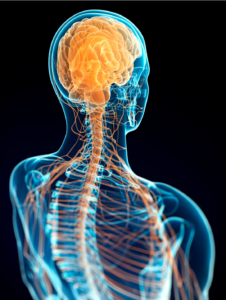In the hustle and bustle of our daily lives, it’s easy to overlook one of the most important aspects of our well-being: brain health. Our brain is the control center for everything we do, and taking steps to optimise its function is crucial for a fulfilling life. We’ll delve into the fascinating world of brain health, exploring how spinal alignment, chiropractic care, and various lifestyle factors impact your brain’s performance.
How does spinal alignment affect your brain?
Our journey towards understanding brain health begins with an unlikely ally – your spine. You might be wondering how your spine relates to your brain’s well-being. Let’s unravel this connection.
How does your spine affect your nervous system?

To understand the profound connection between your spine and brain, it’s essential to grasp the role of the nervous system. Your spine serves as the protective housing for the spinal cord, a critical component of the central nervous system.
The central nervous system is responsible for transmitting and receiving information between your brain and the rest of your body. Any disruption in this communication, often caused by spinal misalignments, can hinder your brain’s ability to control various bodily functions.
How does proper spinal alignment benefit your brain?
Proper spinal alignment is like the foundation of a sturdy building. When your spine is correctly aligned, it facilitates optimal nerve function, allowing clear communication between your brain and the rest of your body. This, in turn, promotes better brain function.
Research indicates that spinal health is linked to cognitive ability among those of an older age. So, if you’ve been searching for brain hacks to sharpen your mental prowess, start with your spine.
How do spinal misalignments put your brain at risk?
On the flip side, spinal misalignments can jeopardise your brain’s health. When your spine is out of alignment, it can interfere with the transmission of crucial nerve signals. This disruption can lead to a range of issues, including:
- Neck pain
- Shoulder pain and stiffness
- Migraines and headaches
- Lower back pain
- Numbness and tingling
- Posture problems
- Arthritis and spine degeneration
- Low energy and fatigue
So, the next time you experience persistent headaches or find it challenging to focus, it might be worthwhile to consider the alignment of your spine as a potential contributor.
What are some brain hacks to improve brain health?
Improving brain health involves adopting various lifestyle practices and habits. Here are some brain hacks to enhance your cognitive function and overall brain health:
- Stay physically active: Regular exercise increases blood flow to the brain, which can help improve memory and cognitive function. Aim for at least 150 minutes of moderate-intensity aerobic exercise per week.
- Eat a brain-boosting diet: Incorporate foods rich in antioxidants, Omega-3 fatty acids, and vitamins like berries, fatty fish, nuts, and leafy greens into your diet. These nutrients support brain health.
- Stay hydrated: Dehydration can impair cognitive function, so drink enough water throughout the day to keep your brain properly hydrated.
- Get quality sleep: Aim for 7-9 hours of quality sleep each night. Sleep is essential for memory consolidation and overall brain function.
- Practice mindfulness meditation: Meditation can reduce stress and improve focus and attention. Even just a few minutes of mindfulness practice daily can be beneficial.
Remember that improving brain health is a long-term endeavour, and adopting these habits consistently can lead to significant benefits over time.
How can chiropractic care improve brain health?

Chiropractic care plays a pivotal role in enhancing brain health through its focus on spinal alignment. The spine houses and protects the central nervous system, including the spinal cord, which serves as the main conduit for nerve signals between the brain and the body. When the spine is misaligned, it can exert pressure on nerves and disrupt the flow of vital information.
Chiropractic adjustments work to correct these misalignments, ensuring that the spine functions optimally. By restoring proper spinal alignment, chiropractic care promotes unrestricted nerve transmission, allowing the brain to communicate effectively with all parts of the body. This enhanced nerve function not only alleviates physical discomfort but also supports cognitive function, mental clarity, and overall brain health.
While chiropractic care can contribute to overall well-being and potentially help individuals maintain better cognitive function and comfort, it’s essential to consult with a qualified chiropractor to discuss your specific needs and determine if chiropractic care is appropriate for you.
Can chiropractic care alleviate headaches and migraines?
Headaches and migraines can be debilitating, affecting your productivity and overall well-being. Chiropractic care offers a non-invasive and drug-free approach to addressing these issues.
Here at Chiropractic Singapore, we specialise in spinal adjustments that can help correct misalignments and relieve the pressure on nerves that may be contributing to your headaches.
By restoring proper spinal alignment, chiropractic care can reduce the frequency and intensity of headaches, improving your overall brain function. Make the first step in improving your mental clarity by booking a consultation with us!
Nurturing your brain for a brighter future
In conclusion, understanding and nurturing your brain health is a multifaceted journey that involves various aspects of your life, from spinal alignment to lifestyle choices. By recognising the interconnectedness of these factors and implementing brain hacks that promote optimal brain function, you can embark on a path to a healthier and more vibrant mind. Take proactive steps to unlock the full potential of your brain and enjoy a more fulfilling life by booking a spinal check-up with a chiropractor today!
FAQs
Let’s address some common questions about brain health and the factors that influence it:
Is stress management vital for brain health?
Yes, managing stress is essential for maintaining brain health. Chronic stress can lead to inflammation in the brain, impairing cognitive function and increasing the risk of mental health disorders. Effective stress management techniques can help alleviate these negative effects and promote brain well-being.
Can nutrition play a role in boosting cognitive function?
Absolutely! Nutrition plays a significant role in brain health. A balanced diet rich in essential nutrients, such as omega-3 fatty acids, antioxidants, and vitamins, can support cognitive function and memory. Including brain-boosting foods in your diet is a proactive way to enhance your brain health.
How does exercise impact brain health?
Exercise has a positive impact on brain health. Physical activity improves blood flow to the brain, triggers the release of mood-enhancing neurochemicals, and promotes the growth of new brain cells. Engaging in regular exercise, whether through aerobic activities, strength training, or daily walks, can contribute to better brain function.
What role does sleep quality play in brain function?
Sleep quality is crucial for brain function. During sleep, the brain performs essential functions like memory consolidation and emotional processing. Inadequate or poor-quality sleep can lead to cognitive impairment, mood disturbances, and an increased risk of neurodegenerative diseases. Prioritizing good sleep hygiene is essential for optimising brain health.
Can scoliosis affect your brain?

Scoliosis is primarily a condition characterised by an abnormal curvature of the spine, typically in an “S” or “C” shape. While scoliosis itself primarily affects the musculoskeletal system and the alignment of the spine, there can be indirect effects on other parts of the body, including the brain, but these effects are not direct or common.
- Neurological issues: Severe cases of scoliosis, especially those that develop during childhood or adolescence and are left untreated, can potentially lead to neurological complications. Pressure on the spinal cord or nerves caused by severe curvature may result in neurological symptoms such as weakness, numbness, or tingling in the limbs. In extremely rare cases, this pressure could impact brain function if the spinal cord is affected high in the cervical (neck) region.
- Changes in posture and muscle imbalance: Scoliosis can cause changes in posture and muscle imbalances as the body compensates for the spinal curvature. These changes can affect overall body mechanics, including the way you hold your head and neck. Prolonged poor posture can lead to tension and discomfort in the neck and shoulders, which may indirectly impact your perception of comfort and cognitive function.
- Psychosocial effects: Living with scoliosis, especially in more visible cases, can lead to psychosocial stressors, such as body image concerns or self-esteem issues. These emotional factors can indirectly affect mental well-being and cognitive function.
It’s important to note that while these indirect effects of scoliosis on the brain and mental well-being are possible, they are not common, and the vast majority of individuals with scoliosis do not experience significant neurological or cognitive issues related to the condition. Proper management and treatment of scoliosis, such as through bracing or surgery when necessary, can help mitigate these potential complications. If you have concerns about scoliosis and its impact on your health, it’s essential to consult with a healthcare professional, such as a chiropractor, for a thorough evaluation and appropriate guidance.









